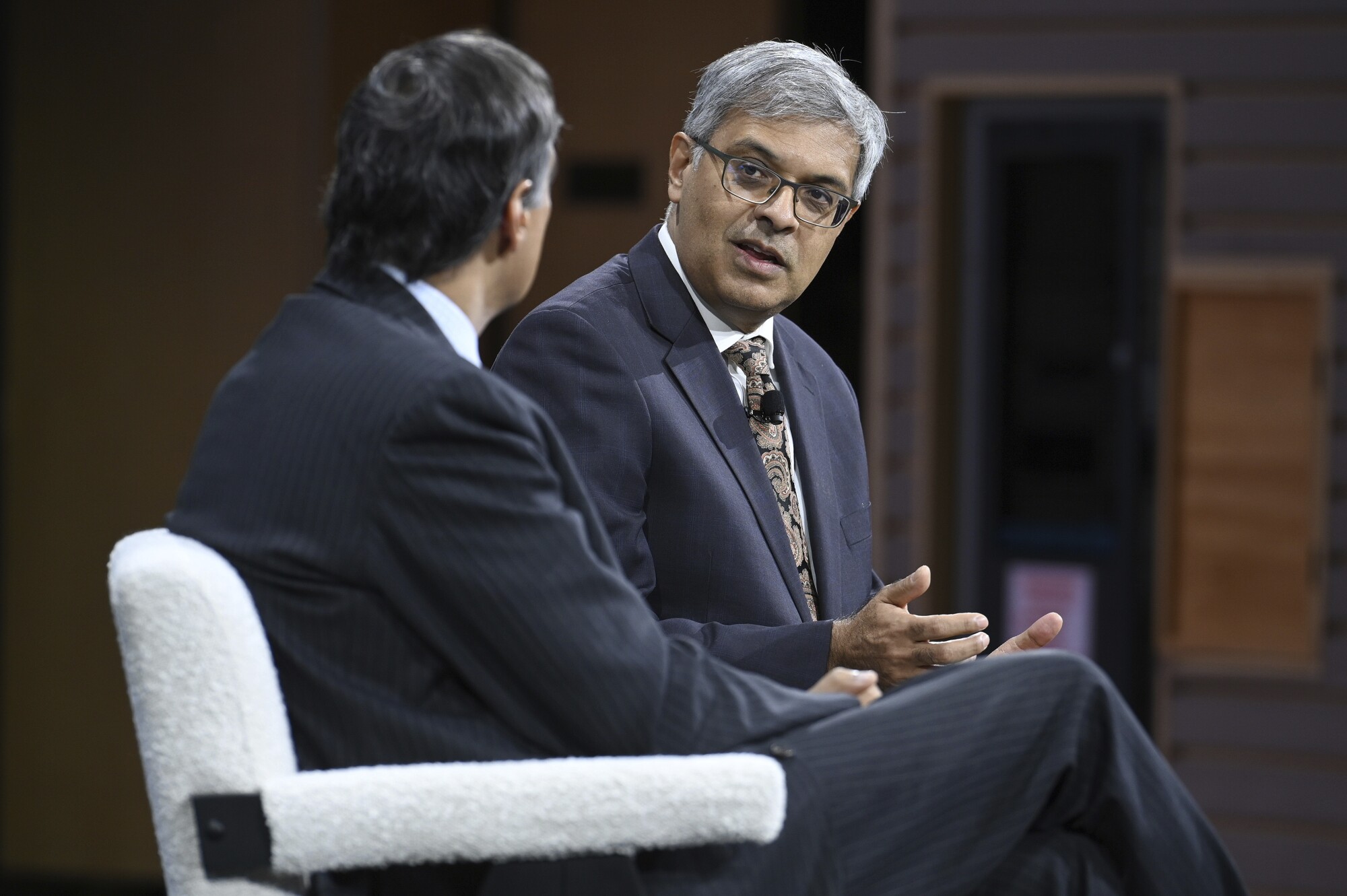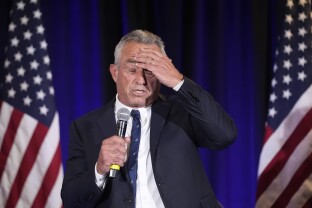President-elect Donald Trump is building an entirely new kind of health team for his incoming administration. While it’s set to be centered around health secretary nominee Robert F. Kennedy Jr., Trump’s nominees for other key health roles have their own sometimes controversial views on pivotal issues — including vaccination, diet-related chronic disease and abortion.
Nearly all of the potential officials so far seem to have Kennedy’s blessing, but their views sometimes differ from his in nuanced but potentially consequential ways.
Kennedy did not respond to a request for comment.
Jim O’Neill
Nominated for deputy secretary of the Department of Health and Human Services
An investor and longtime close associate of Peter Thiel, O’Neill has the most prior agency experience of Trump’s public health nominees: first at the Department of Education, then at HHS, where he served as principal associate deputy secretary during the second Bush administration. Trump reportedly considered O’Neill for Food and Drug Administration commissioner in 2016.
Like Kennedy, O’Neill has been critical of the FDA’s drug-approval process. In 2014, O’Neill said that he wanted to change FDA approval protocols so that drugs could be sold after they’d been proven safe but without any proof that they worked. He has also said that the FDA should not regulate some lab-developed tests.
But when it comes to vaccines, O’Neill’s views seem to differ from Kennedy’s on a few points. While he has been critical of vaccine mandates, he doesn’t seem to share Kennedy’s fears about the dangers of vaccines, including the COVID-19 vaccine.
“Much of the anxiety around some of the COVID-19 vaccines stems from the novelty of the mRNA vaccine technology,” O’Neill told Forbes for a 2023 story on the then-new mpox vaccine. “The FDA-approved vaccine that’s being used to prevent mpox, JYNNEOS, however, is a live attenuated vaccine, which is a much older vaccine technology that offers broader protection and has decades of safety data as compared to subunit vaccines. This technology has been used in successful vaccines for measles, mumps, rubella and tuberculosis, and it eliminated smallpox.” O’Neill also faulted HHS for not producing mpox vaccines quickly enough to meet demand.
O’Neill may also differ from Kennedy in his relationship to the pharmaceutical industry. He recently served as CEO of SENS Research Foundation, a nonprofit that funds antiaging research, including through investments in drug development companies.
While Kennedy has made improving the quality of the American food supply a central tenet of his policy initiative — saying that a diet of foods that have been “poisoned” by corporations leads to chronic disease — it appears O’Neill is principally concerned with the effects of aging.
“The common driver of all chronic, progressive diseases such as Alzheimer’s, heart disease, arthritis, and cancer is aging,” O’Neill wrote on X in 2020. “By manipulating aging, we can prevent these diseases and extend healthy life.”
O’Neill did not respond to a request for comment.
Marty A. Makary
Nominated for commissioner of the Food and Drug Administration
A British American surgical oncologist, author and professor at Johns Hopkins University, Makary rose to prominence during the COVID-19 pandemic for criticizing vaccine schedules and mandates, a position that Kennedy has also taken. But Makary has also given broad public support for childhood vaccines and was an early proponent of universal masking during the pandemic.
While he has backed Kennedy’s goals of refocusing the public health infrastructure on preventing chronic disease, he has not said that he would support a large-scale firing of FDA employees like Kennedy suggested on X. Many of Makary’s criticisms of the FDA during the pandemic centered around what he perceived as the agency’s sluggishness to approve COVID-19 treatments — a far cry from Kennedy’s claims that the agency is waging a “war on public health” by suppressing treatments that “can’t be patented by Pharma.”
Makary has also echoed many of Kennedy’s criticisms of seed oils, ultra-processed foods and food additives, saying on a podcast in September that such ingredients could disturb the microbiome and contribute to chronic diseases, including mental health issues — a claim that has been supported by some studies. In announcing Makary’s nomination, Trump wrote that Makary will “work under the leadership of Robert F. Kennedy Jr. to, among other things, properly evaluate harmful chemicals poisoning our Nation’s food supply and drugs and biologics being given to our Nation’s youth, so that we can finally address the Childhood Chronic Disease Epidemic.”
But one point on which Makary appears to disagree with Kennedy is the dangers of cell phones. (The FDA, along with the Federal Communications Commission, makes recommendations on the amount of radiation cell phones are allowed to produce.) While Kennedy has claimed that radiation generated by cell phones and wireless communication networks can cause cancer, Makary posted on X in 2011 that “the association between cell phones/cancer is too weak to stop using.” Most scientists agree that it is unlikely that the radiation generated by cell phones is strong enough to cause disease, although some say more research is needed.
Makary did not respond to a request for comment.
David Weldon
Nominated for director of the Centers for Disease Control and Prevention
A former Florida congressman and a physician like Makary, Weldon has long supported the same theories about the dangers of vaccines as Kennedy, including the disproven idea that vaccines can cause autism. While in Congress, Weldon introduced a “vaccine safety bill” that would have removed vaccine safety research from the CDC’s purview and created a separate agency for it in HHS.
But Weldon differs from Kennedy in his views on abortion. While Kennedy has drawn ire from conservative lawmakers for his relatively lax views on abortion, Weldon crafted an amendment during his time in Congress that would have prohibited HHS from funding programs that didn’t support health insurance plans that refused to cover abortions. The CDC runs surveillance of abortions in the U.S.
Weldon’s views on other issues related to the CDC that Kennedy has strong opinions on — including fluoride supplementation in water and infectious disease preparedness and prevention — are unclear.
Weldon did not respond to a request for comment.
Janette Nesheiwat
Nominated for surgeon general
Nesheiwat is a medical director for a chain of urgent care clinics in New York and appears regularly on Fox News as a health commentator. Like Kennedy, she has had concerns about the safety and efficacy of vaccines, although her concerns appear to be more limited than Kennedy’s, drawing criticism from other anti-vaccine advocates. Still, she wrote on X in 2022, “If CDC approves a covid vaccine addition to the routine schedule of vax for kids, it will mark the most egregious unethical & harmful decision to children. No mandates. Especially for a vax that can’t prevent disease.”
While the surgeon general has historically been a mostly ceremonial role, some previous officials have used the platform to shape the public’s opinion of health crises. During the Reagan administration, C. Everett Koop played a key role in educating the public about AIDS.
Nesheiwat did not respond to a request for comment.
Mehmet Oz
Nominated for administrator of the Centers for Medicare and Medicaid Services
A TV host, physician and former political candidate, Oz, like Kennedy, has a history of promoting dubious medical claims. Health experts criticized Oz for promoting unproven treatments on his daytime talk show, including alternative COVID-19 therapies like the malaria drugs hydroxychloroquine and chloroquine, which were at the time poorly tested in COVID-19 patients and were later found to be ineffective and carry significant risks. Trump had also promoted those unproven treatments as president.
Oz has also promoted a number of “miracle” weight loss alternative drugs. His claims resulted in senators chewing him out for promoting misinformation during a 2014 Senate subcommittee hearing.
But Oz has also championed new drugs that treat obesity like Ozempic — unlike Kennedy, who has criticized the drug for its high price and for treating the symptom of obesity rather than the cause. The Biden administration recently proposed a new rule that would require Medicare and Medicaid to cover these drugs, but the rule would have to be endorsed by the incoming Trump administration in order to go into effect.
Oz did not respond to a request for comment.

Jay Bhattacharya
Nominated for director of the National Institutes of Health
Bhattacharya is a professor of medicine, economics and health research policy at Stanford University and director of the university’s Center on the Demography and Economics of Health and Aging. Like Kennedy and Makary, he rose to a new level of prominence during the COVID-19 pandemic when he co-authored a 2020 letter calling for an end to lockdowns in favor of a herd immunity approach.
After being met with criticism by public health officials, including longtime NIH Director Francis Collins, Bhattacharya began advocating for a restructuring of the NIH and a reduction in the number of career civil servants at the agency. Kennedy has also called for a shake-up at the NIH, saying that he would fire 600 employees on Trump’s first day in office.
Like Kennedy, Bhattacharya has advocated for a ban on gain-of-function infectious disease research, calling it dangerous. Most scientists say that gain-of-function research can be useful to scientists’ understanding of pathogens and safe when properly regulated. The NIH is the primary government agency responsible for distributing funds for biomedical and health research.
Bhattacharya does not, however, appear to hold doubts about the safety and efficacy of vaccines beyond what the scientific research shows. He has blamed vaccine mandates for the decrease in public trust in vaccines.
Bhattacharya did not respond to a request for comment.
Bonus: Brooke Rollins
Nominated for secretary of the Department of Agriculture
Perhaps the nominee with the greatest likelihood of disrupting Kennedy’s agenda on chronic disease and food quality is Rollins, leader of the America First Policy Institute and domestic policy chief during Trump’s first administration.
Rollins’ limited background in agricultural policy makes it difficult to know how she would lead the USDA, but she does not appear to hold the same views on farming as Kennedy. Rollins wrote on X following her nomination that “it will be the honor of my life to fight for America’s farmers and our nation’s agricultural communities.”
Kennedy said in October that Trump would give him “control” of the USDA and that he would “rewrite the regulations” to prioritize a return to small-scale, regenerative agriculture and reductions to pesticides.
While Kennedy has publicly congratulated O’Neill, Makary, Weldon, Oz and Bhattacharya on their nominations, he has not congratulated Nesheiwat or Rollins.
Rollins did not respond to a request for comment.
—
Margaret Manto is a NOTUS reporter and an Allbritton Journalism Institute fellow.
Sign in
Log into your free account with your email. Don’t have one?
Check your email for a one-time code.
We sent a 4-digit code to . Enter the pin to confirm your account.
New code will be available in 1:00
Let’s try this again.
We encountered an error with the passcode sent to . Please reenter your email.


